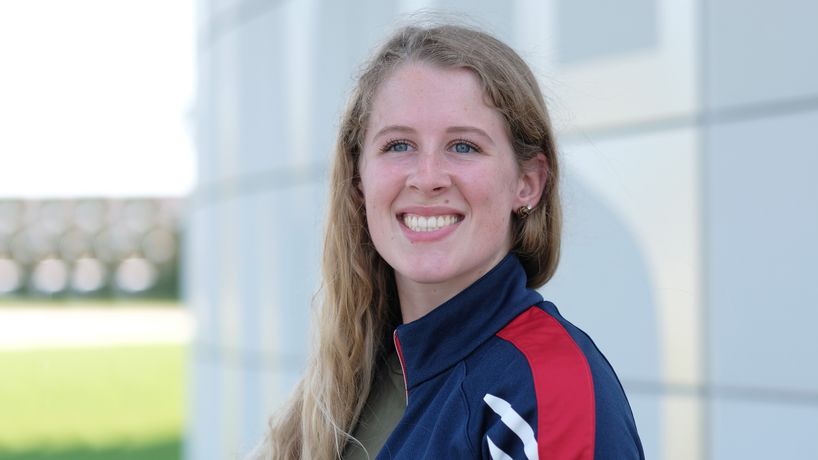
Shannon Keys was part of a team that researched the most effective ways to design an e-commerce model for Graybar, a St. Louis-based company, as part of Adjunct Assistant Professor Mitch Millstein’s Supply Chain Practicum course and presented recommendations to Graybar Vice President and Chief Financial Officer Scott Clifford in August. (Photo by August Jennewein)
Shannon Keys’ favorite college memory happened across the Atlantic Ocean.
The College of Business Administration student took advantage of a study abroad opportunity offered by the University of Missouri–St. Louis. She was one of 12 students who traveled to Belgium and the Netherlands with Associate Teaching Professor Michael Costello.
“He shared so much knowledge with us and gave us an opportunity to experience firsthand how businesses operate in other countries,” Keys said. “We were able to experience the culture in Brussels, the beauty in Bruges and business in Amsterdam – an unforgettable opportunity that I was given the privilege of experiencing with my UMSL community.”
Keys, who is pursuing a BSBA with an emphasis in supply chain management and anticipates graduating in December, utilized the skills she learned during both her study abroad trip and UMSL classes to explore improving the operations of Graybar, an electric supply company, through e-commerce. Along with classmate Ashlie Vickers, she presented her findings to Graybar Vice President and Chief Financial Officer Scott Clifford in August.
The project came about as part of Associate Director of the Center for Business and Industrial Studies and Adjunct Assistant Professor Mitch Millstein’s Supply Chain Practicum course. The class was split into three groups, and each group researched solutions to a real-life problem presented by a St. Louis company.
Keys and Vickers dug into researching and brainstorming the most effective ways to design an e-commerce model for Graybar.
“What we found was that you need relevant data and lots of it,” Keys said. “You need to be able to measure your current processes, how they are working, what areas can be improved and what you are doing well already and do not need to spend as much energy on. It’s important to be able to identify what needs your attention and what doesn’t at the moment so that you can work as efficiently as possible.”
Early in their project, the pair hit a snag in their research. They discovered there wasn’t much data available that was relevant to the topic. They regrouped, broadening their initial idea to fit the data available, and recommended types of data to collect in the future.
Over the course of eight weeks, they researched companies similar to Graybar, looking at how each group successfully used data to implement change, in order to recommend a plan of action for the organization.
Their research culminated in a presentation highlighting how to create a value-added e-commerce operation. Keys pointed out that a successful e-commerce site requires integration between suppliers, distributors, transportation, inventory, customer service and customer needs.
Data is needed to measure the performance of each piece of the model. Like their research, providing up-to-date data presents a challenge when operating an e-commerce site, but the benefits are worth the effort.
“The data used in successful e-commerce sites gives you valuable insight into the entire life cycle of your product and offers opportunities to improve things that were invisible to you before you prioritized accurate data collection in your processes,” Keys said.
Implementing e-commerce into a business ultimately increases communication between all parties connected with a product. For instance, employees are able to automatically see when a shipment is running late or when an item will be out of stock. Companies can also learn what items are being clicked on frequently but not purchased.
Because the practicum and project took place virtually in the midst of the COVID-19 pandemic, Keys and Vickers were not able to meet face-to-face. However, they communicated frequently via Zoom throughout the eight-week course, offering project updates to their class each week and running through their presentation multiple times.
Initially, they presented their findings to Millstein and their classmates. Following the first presentation, Keys and Vickers presented to Clifford in August.
“I get nervous when I present anything or talk to groups of more than four people, but we practiced so much that I felt confident I knew my stuff and could give a solid presentation of our proposed solution and recommendations,” Keys said. “Ashley and I were pleased with how our final presentation went and were proud of all our hard work.”
The Graybar project is the latest in a long line of real-world experiences Keys has enjoyed within her field. She’s completed internships at Boeing, Companion Bakery, the City of Columbia and Hub Group.
At UMSL, she’s actively involved in the Supply Chain and Transportation Club and is a member of Delta Sigma Pi, where she serves on the executive committee.
She declared her supply chain major before her first semester began and remains positive she’s on the right career path.
“I absorb so much knowledge and genuinely enjoy hearing from professors, especially those who have experience working in the business world and have stories and insights from their business careers,” she said. “I firmly believe what I put into my UMSL experience is what I got out of it. I’ve never regretted my decision to come to UMSL.”
After graduation, the Columbia, Missouri, native plans to remain in the St. Louis area. She’s excited about the next steps and hopes to join a company that offers a good work-life balance while supporting her career goals.
To achieve success, Keys believes dedication and discipline are crucial.
“I have always been a hard worker,” she said. “I don’t like to leave things unfinished, and I have high expectations for myself. I have been working hard to practice gratitude and be thankful even for bad days, because my bad day might be a great day for someone else.”














